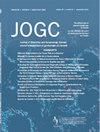The Impact of the HPV Vaccine on Preterm Birth in British Columbia
IF 2.2
Q2 OBSTETRICS & GYNECOLOGY
引用次数: 0
Abstract
Objectives
Recent evidence has suggested that human papillomavirus (HPV) vaccination may reduce the risk of preterm birth. The objective of this study was to determine the feasibility of linking existing provincial databases to begin to understand whether the risk of preterm birth is lower in HPV-vaccinated women in British Columbia (BC).
Methods
In this population-based retrospective cohort study of women delivering infants in BC, data on birth outcomes and HPV vaccination status from the BC Perinatal Data Registry and the Panorama Public Health Information System were linked. We compared the overall and spontaneous preterm birth rates between vaccinated and unvaccinated women using logistic regression.
Results
Among women who were age-eligible for HPV vaccination in school-based programs, there were 5447 deliveries from 5399 individuals between 2015 and 2018. Of these, 2925 (54.2%) women had been vaccinated in the school-based program. Overall and spontaneous preterm birth were significantly associated with previous preterm delivery and maternal substance use, but were not found to be associated with HPV vaccination status.
Conclusions
We were readily able to link provincial databases to assess the role of HPV vaccination in preterm birth risk. These pilot data did not show a significant association between HPV vaccination status and preterm birth. Subsequent larger studies are warranted to better assess the presence of a relationship, which may promote vaccination and result in improved reproductive outcomes for women and their infants.
HPV疫苗对不列颠哥伦比亚省早产的影响
目的:最近的证据表明,HPV疫苗接种可以降低早产的风险。本研究的目的是确定连接现有省级数据库的可行性,以便开始了解不列颠哥伦比亚省接种hpv疫苗的妇女早产风险是否较低。方法:在这项以不列颠哥伦比亚省分娩的妇女为基础的人群回顾性队列研究中,来自不列颠哥伦比亚省围产期数据登记处和全景公共卫生信息系统的出生结局和HPV疫苗接种状况数据被联系起来。我们使用逻辑回归比较了接种疫苗和未接种疫苗的妇女的总体早产率和自发性早产率。结果:在学校项目中符合HPV疫苗接种年龄的女性中,2015-2018年期间有5399人的5447次分娩。其中,2925名(54.2%)妇女在以学校为基础的方案中接种了疫苗。总体和自发性早产与既往早产和母体药物使用显著相关,但未发现与HPV疫苗接种状况相关。结论:我们很容易能够连接省级数据库,以评估HPV疫苗接种在早产风险中的作用。这些试点数据没有显示HPV疫苗接种状况和早产之间的显著关联。后续更大规模的研究是有必要的,以更好地评估这种关系的存在,这可能会促进疫苗接种并改善妇女及其婴儿的生殖结果。
本文章由计算机程序翻译,如有差异,请以英文原文为准。
求助全文
约1分钟内获得全文
求助全文
来源期刊

Journal of obstetrics and gynaecology Canada
OBSTETRICS & GYNECOLOGY-
CiteScore
3.30
自引率
5.60%
发文量
302
审稿时长
32 days
期刊介绍:
Journal of Obstetrics and Gynaecology Canada (JOGC) is Canada"s peer-reviewed journal of obstetrics, gynaecology, and women"s health. Each monthly issue contains original research articles, reviews, case reports, commentaries, and editorials on all aspects of reproductive health. JOGC is the original publication source of evidence-based clinical guidelines, committee opinions, and policy statements that derive from standing or ad hoc committees of the Society of Obstetricians and Gynaecologists of Canada. JOGC is included in the National Library of Medicine"s MEDLINE database, and abstracts from JOGC are accessible on PubMed.
 求助内容:
求助内容: 应助结果提醒方式:
应助结果提醒方式:


